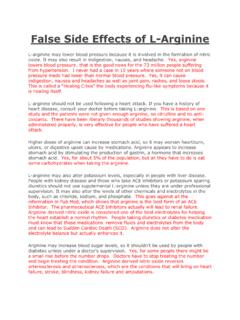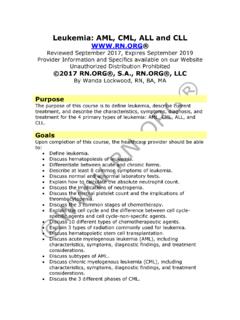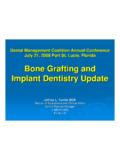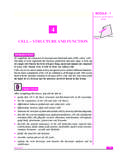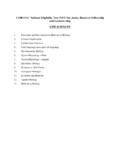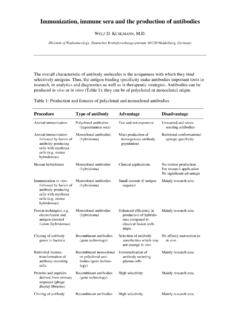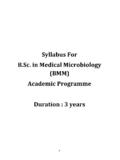Transcription of L-Arginine & Cancer - Positive Designs
1 L-Arginine & Cancer Arginine and Cancer . Does arginine promote or retard Cancer growth? Should Cancer patients be cautioned against 5 grams arginine per day? I reviewed the pubmed database using the search terms L-Arginine and Cancer and retrieved over 1,000 articles. Many actually referred to specific nitric oxide studies in lab animals and in vitro Cancer cell lines, and overall were too difficult to summarize. Such statements as NO causes metastasis would be contradicted in the next article by the statement NO prevents metastasis and causes tumor regression. I found about 50 articles which actually referred to the use of L-Arginine and its inhibitors which seemed useful to the question at hand. Theoretical concerns include: Increased blood flow may feed the tumor Increased growth hormone due to supplementation with arginine may cause tumor growth Arginine itself may feed auxotrophic tumors, those which cannot manufacture arginine themselves, such as melanoma and hepatocellular carcinoma.
2 BLOOD FLOW As you know, L-Arginine can be utilized by the body to make arginine derived nitric oxide (ADNO). Nitric oxide synthase (eNOS, or NOS I) is the enzyme responsible for this in the endothelium. The nitric oxide dilates blood vessels. But will that increase blood flow to tumors? There is one study documenting diminished blood flow to tumors after NOS inhibitor was used. While inhibition of ADNO production diminishes tumor blood flow 1, it is not clear that the enhanced blood flow due to arginine supplementation would enhance tumor growth. In fact, L-Arginine has been used in Cancer therapy. Read on. GROWTH HORMONE L-Arginine supplementation can2 3 (but does not always4) increase serum growth hormone concentrations in humans. One well-designed study compared men to women with various growth hormone secretagogues, including arginine (30 grams IV), exercise, growth hormone releasing hormone, somatostatin rebound, compared to rest and saline for each individual.
3 The impressive thing is that the exercise stimulus was roughly equivalent to 30 grams of intravenous L-Arginine , a dose several times more and via a different route than we are advocating. (Even my own husband, a Cardiococktail junky, takes only 20 grams at most each day, and he does not yet mainline the stuff.) If you enjoy a well-designed, well-executed study, you ll enjoy reading this article. The link to the full text is in the footnotes. 5 In another randomized, placebo-controlled study in healthy men, placebo was compared to Arginine alone, placebo +exercise, or Arginine + exercise. The dose was 7 grams oral Arginine. The exercise yielded a greater growth hormone response than exercise + Arginine or Arginine alone. 6 It is true that patients who received growth hormone injections in the past are considered at a higher risk of various cancers, including leukemia.
4 What is not known is whether the growth hormone which may be secreted after arginine supplementation will trigger the same potential for tumor support as a recombinant injection. And since the growth hormone produced in response to oral arginine would be less than exercise stimulation, are we going to tell them not to exercise because the growth hormone produced by the exercise might promote Cancer ? SPECIAL CASES: MELANOMA AND HEPATOCELLULAR CARCINOMA These are the only group of people whom I think should be warned against using L-Arginine . Melanoma, hepatocellular carcinoma and possibly leukemic cells7 require L-Arginine to be supplied for their growth. They lack the enzymes necessary to convert L-citrulline into L-Arginine , and sometimes from L-Arginine into nitric oxide. 8 9 This particular characteristic has already been exploited in tumor research with good results.
5 Interestingly, in a mouse model if these cell types are transgenically infected with the enzymes to convert L-Arginine into nitric oxide they LOSE THE ABILITY TO METASTASIZE. 10 Yet NOS activity is higher in melanoma than melanocyte cell lines in vitro. 11 A number of trials have used arginase (an enzyme responsible for changing arginine to ornithine) to treat hepatocellular carcinomas. These have resulted in responses with regression in both metastasis and the primary An arginine diiminase (another enzyme which breaks down arginine) from Mycoplasma has been used in multiple trials. One trial shrank a tumor from an unresectable to a surgically resectable size. Other studies show inhibition of hepatocellular carcinoma and malignant melanoma cells both in vitro and in vivo. 13 Human Studies What happens if we give L-Arginine to real, live Cancer patients?
6 Many studies have utilized L-Arginine as a component in perioperative nutrition and immunomodulation, and some have even used it as an adjunct to chemotherapy. After explaining immunonutrition and the immune dysfunction in Cancer , I ll talk about some specific Cancer studies using L-Arginine supplementation. Immunonutrition is the concept of optimizing the immune system through giving proper nutrients, nutrients known to improve blood components known to fight Cancer or infection, such as IgG and IgM, Natual Killer (NK), Lymphokine-Associated Killer (LAK), and T-cytotoxic cells, while diminishing the circulating components known to undermine host defenses such as T suppressor cells and IL-6. L-Arginine appears again and again as a beneficial component of these formulations. These studies support the safety of formulae containing L-Arginine , reveal the improvement of patients immune markers over control groups who did not receive immunonutrition, and a few even suggest a trend toward better survival in Cancer patients.
7 It is known that there is immune dysfunction in Cancer ; it is believed that poor immune function allows Cancer to thrive in the body. How does this happen? And how does L-Arginine interact with the immune system in Cancer ? Myleoid cells Immature myeloid cells actually protect tumors. When exposed to the environment of the tumor, they become myeloid suppressor cells resulting in poor function of immune system. They develop increased arginase activity, breaking down arginine, and making it unavailable to T-cells. Arginine is directly responsible for T-lymphocyte cell cycle progression14, T-cell proliferation, and production of cytokines. Since macrophages in tumors are known to secrete Arginase I, 15 it is not surprising that in Cancer , T-cells have a decreased ability to proliferate and decreased production of cytokines.
8 Arginase I also decreases expression of T-cell receptor CD3zeta chain , 16 17 and impairs T-cell responses. In fact Arginase I is increased in tumors relative to surrounding normal tissues, and often in Cancer patients serum in Addition of excess arginine restores T-cell proliferation, cytokine production and CD3zeta receptor General Cancer Studies In one study, Arginine, glutamine and omegas were supplemented in trauma, burn and Cancer patients. All patients had increased lymphocytes, CD4, CD8 cells, Complement 3, IgG, and IgA; with decreased Three studies (2 were double blinded) studied a mixtures of Arginine, glutamine, omeaga3, omega 6, RNA, vitamins E, C, A. 3 studies showed decreased infection rate in surgical patients (down 75%!), and hospital length of stay was 20% Arginine 25 grams daily was compared to glycine 43 grams of supplement in 30 Cancer patients undergoing surgery.
9 Positive mean nitrogen balance, although moderate, was achieved only in the arginine group. The immune effect was much more noticeable, with improvements in T-lymphocyte response to stimulation and increase in CD4 However, in advanced gastric Cancer 30 grams daily of L-Arginine for a week did not stimulate lymphocyte function. It was found to be safe in this patient Another study in patients undergoing major surgery for Cancer found no difference inlymphocyte proliferation or monocyte function between Control groups, compared to groups given arginine or to arginine plus Thymic hormone (thymulin) levels, known to be low in Cancer patients, are improved by lysine-arginine mix. The levels ultimately were higher than in age-matched controls, and the patients had increased numbers of peripheral T-cell Head and Neck: A number of head and neck Cancer studies evaluated perioperative nutrition via several regimens.
10 L-Arginine was found to be safe in all cases, and generally well-tolerated. These all are supportive of the use of L-Arginine in a general nutritional regimen. The entire regimen did not prolong life, but did reduce wound complications, fistulae, hospital stays and hospital costs. One study of supplementation revealed better protein levels26. Another randomized study revealed increased lymphocytes, CD4, CD4/8 ratios on day 4 and CD3, CD4, CD4/8 on PO8. In a malnourished subgroup in the same study, the arginine supplemented group had decreased incidence of postoperative and wound complications and length of stay in the Other studies showed decreased fistulae 28 29 30, in the groups receiving L-Arginine supplements. The studies had differing result regarding length of stay in the hospital. Other studies showed no difference in nutritional or inflammatory markers between groups,31 and no difference regarding nutritional status, complications, but a trend toward better survival in Arginine supplemented Breast Cancer patients: Although L-Arginine supplementation inhibits growth of tumors in animals, it seems to stimulate tumor protein synthesis in tumors of humans supplemented with L-Arginine .
